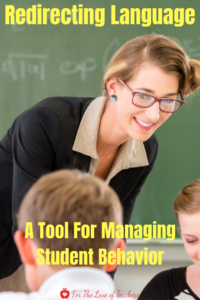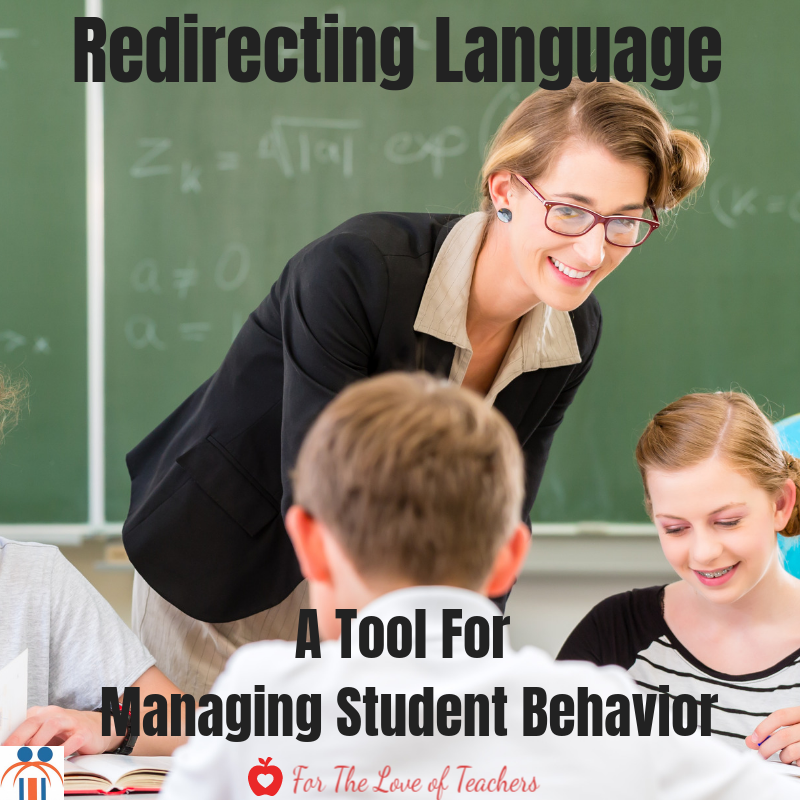If you’ve read my post, How To Use Teacher Language To Empower Students, you know that the tone and words we use impacts student behavior. The power of our words, along with non-verbal expressions, can make or break your day or relationships. When it comes to classroom management, the way we speak to kids is really important as we continue to build healthy student-teacher relationships, peer relationships and establish a classroom environment that is safe and respectful for all.
Responsive Classroom’s Redirecting Language has helped a great deal in redirecting student behaviors in a firm and direct way. It is clear, non-negotiable instructions when students are too deeply invested in their off-track behavior to correct themselves. The teacher redirects them with firm words that consist of statements or commands that are clear and respectful of children (www.responsiveclassroom.org).
Characteristics of Redirecting Language:
Direct and specific.
“David, hands in your lap.”
Names the desired behavior (Say do statements, not don’t).
“All eyes on me.”
“Sit at another table where you can pay attention to your work.”
“Clean up your work area.”
“Walk.”
Keep it brief.
“Books closed. Eyes and ears on me.”
Make a statement, don’t ask a question (Language is firm and non-negotiable).
Instead of “Where is your book?” say, “Get your book out and begin your morning work now.”
Redirecting Language in Action:
Group Sessions:
“Use quiet voices.”
“Stop and think. Then raise your hands if you have an idea.”
Independent work sessions:
“Use kind words.”
“Take turns with the markers.”
Transitions:
“You have one minute to finish cleaning up.”
“Push your chair in and line up.”
Thoughtful Teacher, a classroom management model designed to transform the way teachers manage their students, has a similar strategy called, Don’t Ask, Direct. Thoughtful Teacher suggests that teachers should avoid posing rhetorical questions related to student behaviors, and instead direct students behaviors.
Here are a few more examples:
Ask |
Direct |
Why is Jerome not focusing on his work? |
Jerome, start your work now. |
Why do I hear chatter? |
All eyes should be on me and every mouth closed. |
Why is it so loud in here? |
Starting now, I expect absolute silence. |
Where do you belong? |
Report to your seat immediately. |
Thoughtful Teacher: 10 Steps To Effective Classroom Management, p. 14
The way we talk to students (and adults) matter. Snag my FREE teacher language cards for reminding, reinforcing and redirecting here and some more Responsive Classroom resources and tips. I keep these teacher language cards on a binder ring for quick access and a reminder when I need to choose the right language to manage student behavior.
If you think that Thoughtful Teacher is for you because you need or want support in classroom management then reach out to your admin about the benefits of Thoughtful Teacher. Don’t be afraid to ask for support or to educate them! For more information visit www.thoughtfulteacher.org. If you have any questions, you can contact info@thoughtfulteacher.org.
Need support? Visit the Forums to ask questions, share ideas and products. Be sure to visit the Shop for classroom management resources and don’t forget to join the email list to receive the latest and greatest updates, plus monthly freebies!!
If you like it, then pin it,



Christine Weis is a passionate educator, classroom management coach, wife, and mom of two busy boys. She enjoys teaching, writing, and creating resources for teachers.





These are good suggestions, especially when you need to be firm about a behavior that needs to be stopped or started. I like that these commands are direct, as well as specific, so that there can be no negotiations or misunderstandings as to the intent of the commands.
Thank you Patricia! Being firm, specific and direct goes a long way! Thanks for reading!
Christine at For The Love of Teachers
These are super helpful tips! I think we all appreciate direct and succinct language at any age. However, I love the tips around ‘do’ language and using statements as opposed to questions for firm, non-negotiable language. I’m going to use these tips with my nieces and nephews, because I definitely struggle with communicating with kids in an effective way.
Thanks so much! That’s fantastic that you’ll try these tips with your nieces and nephews. You’ll be a pro in no time. 😉 Thanks for reading!
Christine at For The Love of Teachers
Communication as a teacher has to be well thought of as it needs to send out the message and bring back obedience and respect. I loved the dissection which is better to understand how to have an impact on students effectively.
Yes! I couldn’t agree more. Using the right language really makes a difference. Thanks for reading!
Christine at For The Love of Teachers
This is great! Words really do have a huge impact. I need to think more about the way I speak in my martial arts class.
They really do! I’m glad you could use this in your Martial Arts class. Thanks for reading!
Christine at For The Love of Teachers
Really great information. You could use this tool any situations for a job or in real life.
Yes, so true! Thanks for reading!
Christine at For The Love of Teachers
I like your comparison of query versus direct approach to affecting student behaviour. I can see the direct approach as a positive way to maintain respect.
Yes! It really does create a level of respect. Thanks for reading!
Christine at For The Love of Teachers
my mom is a teacher, definitely going to share these tips with her!
Great..please do! Thanks for reading!
Christine at For The Love of Teachers
Omg, I wish I knew about this when I used to do clinicals at a school district! This would have been helpful when I was interacting with kids! I’ll be keeping this tool in mind for the future!
Good, I’m glad! Put it in your teacher toolbox! 😉 Thanks for reading!
Christine at For The Love of Teachers
Those are such insightful tips. Education has evolved so much in the past few decades. So good to see that teachers are now sensitive to the needs of the students.
This is really helpful for new teachers and even older ones! I’ve never thought of this before but the directing and not asking seems so simple and yet very effective!
Exactly! Being specific and direct is key to good communication. Thanks for reading!
Christine at For The Love of Teachers
The world of teaching has changed so much recently! I’m a bit old school, literally, nothing beats a book, notepad and good old memorization.
It sure has and it continues to change rapidly. Thanks for reading!
Christine at For The Love of Teachers
This is so useful. I have learned to say than ask and know it definitely is better but I sometimes end up with questions or don’t statements.. need to stop that now..
Yes…it’s a habit that needs some breaking. I catch myself asking questions all the time. Thanks for reading!
Christine at For The Love of Teachers
This guide is so helpful. I wish my teachers could have such kind of information with them!!! :p
Thanks so much! I’m glad it is helpful. Thanks for reading!
Christine at For The Love of Teachers
I feel like these situations could be used as an adult as well with a little tweeking. What a great share. Thank you!
Yes…I agree! Thanks for reading!
Christine at For The Love of Teachers
As an instructor for Adult Learners, these tips are so useful
Great! I’m so glad! Thanks for reading!
Christine at For The Love of Teachers